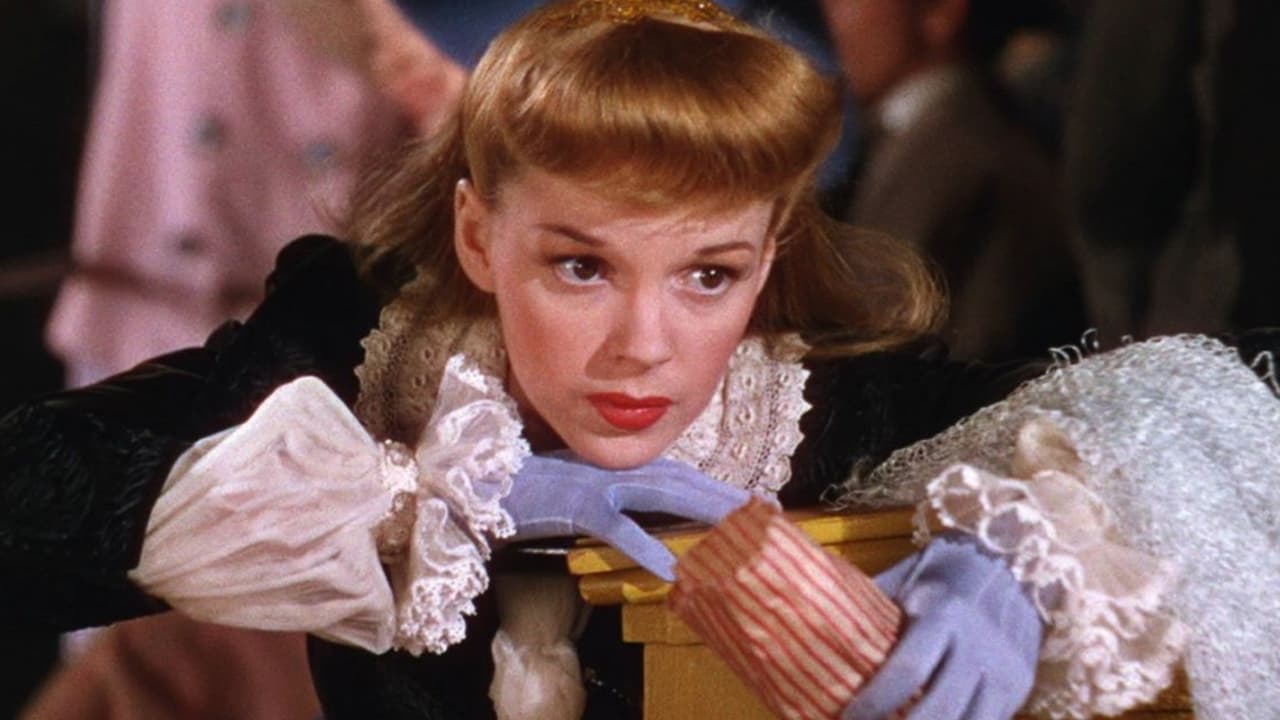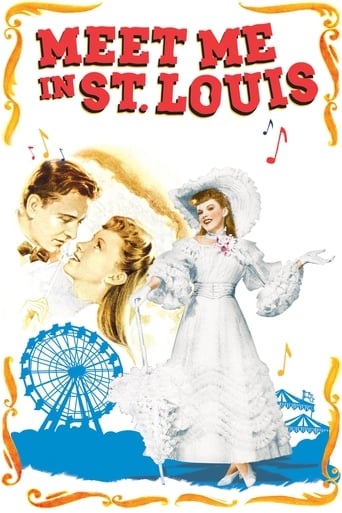Stellead
Don't listen to the Hype. It's awful
Reptileenbu
Did you people see the same film I saw?
SteinMo
What a freaking movie. So many twists and turns. Absolutely intense from start to finish.
Curapedi
I cannot think of one single thing that I would change about this film. The acting is incomparable, the directing deft, and the writing poignantly brilliant.
hoyayer
Aside from the fact that Esther is a seriously manipulative psychopath, and Tutti has some bad death issues, Judy Garland manages to disguise her character beautifully.We're all fortunate that Garland refused to sing the original words to "Merry Little Christmas" -- 'Have yourself a merry little Christmas, It may be your last.' Her reasoning was that the audience would hate her. They sure would have, and it would have blasted the main character's cover permanently.Instead we got this wonderful collection of songs and silliness!
dougdoepke
Justly legendary musical from MGM. It's just the sort of lavish production the studio specialized in. Nothing too serious beyond romantic mix-ups, along with happy endings you can count on. It's also perfectly cast with little Tootie (O'Brien) stealing the film under heavy competition from a starry-eyed Garland. Note that except for dad (Ames) the men have clearly secondary roles. Note too that it's the girls who get to flounce around in wardrobe's best period frocks, and a sight they are. The musical selections are outstanding. I especially enjoyed Tootie and Es's (Garland) cute little song and dance, Under The Bamboo Tree. And, just for spice, Tootie singing that she won't get drunk anymore! That is, when she's not plotting dark mischief.No need to go on about one of Hollywood's most revered musicals. Sometimes things just fall magically into place as they do here. I do have to say that I enjoyed the first "family" part more than the second more conventional "romantic" part. But that's just minor. Anyway, it's decades since I last saw the 100+ minutes, but am really glad I tuned in again. And so will you, if you haven't already.
mark.waltz
If you want a five letter word for "the perfect musical", here is your title, a film so sentimental yet true to the human desire for home and roots that even today it remains fresh and alive, colorful and magnetic in every way. Of course, it will always be remembered as the film which first paired Judy Garland and director Vincent Minnelli (although he was the one responsible for the "Our Love Affair" fruit/cake orchestra in "Strike Up the Band!") and the film which moved her from black and white ingénue into one of MGM's most photographic Technicolor ladies. It will also be remembered as the film which moved rising child star Margaret O'Brien into the realm of Judy's past as MGM's greatest young actress and for the many beautiful songs which were written for it in its translation onto the screen. There's even the unfortunately short-lived but much loved 1990 Broadway musical version of it which had been trailing around as a touring production for years before being perfected for the Great White Way. A T.V. series was also developed years later when MGM moved into that medium, but nothing can top the wedding cake of perfection that is this salute to the early part of the 20th Century when state fairs (like one perfected in song by Rodgers and Hammerstein the following year) were must-visit attractions and "courting" was the way young lovers romanced each other-by gaslight!From the moment that Judy pokes her head out the window to sing her love of "The Boy Next Door", you know that her future as a maturing leading lady looks brighter than ever. Gone are the Mickey Rooney "Let's put on a show!" films, and even if she does put on a show here (in an impromptu duet with Ms. O'Brien), it's much more believable, as it is part of a house party where Judy does more than her share of trying to catch the eye of that particular boy, played here by the handsome Tom Drake. Her parents are played by Leon Ames and Mary Astor, and if it is at first jarring to see the vixen of "The Maltese Falcon" playing a house frau, just remember that she had played Judy's mother once before: in "Listen, Darling!"."Older sister" Lucille Bremer was Arthur Freed's big attempt to create a new leading lady, and while she's a likable young actress, she seems lost when shown on screen with the magnetic Judy and the perky Margaret. Then, there's the beloved "grandpa", played by that old rascal, Harry Davenport, and the family's cranky but lively maid, Marjorie Main, who dominates the kitchen (and her ketchup recipe) much like Mary Wickes would do almost a decade later in two Booth Tarkington similar stories, "On Moonlight Bay" and "By the Light of the Silvery Moon". Ironically, in the big Broadway musical, another MGM leading lady of the 1940's, Betty Garrett, would assume that part, stealing every moment she was on screen.The story is a simple one: Papa Ames wants to move the family from St. Louis to New York and their desire is to remain there for the upcoming world's fair. O'Brien goes homicidal, burying her dolls and killing the snowmen, which leads to a comforting scene where Judy serenades the sobbing girl with "Have Yourself a Merry Little Christmas". It should be noted that the original lyrics of that Christmas standard were much darker than what was heard on screen, yet perfectly in tuned with the sometimes darkened theme of the story. Such is the case with the Halloween sequence where O'Brien must "assassinate" the town grouch by pelting him with flour. You wouldn't see anything like this in a Greer Garson movie!Once Judy steps onto a streetcar for the famous "Trolley Song", you've got the stuff that show business legends are made of. The team of Arthur Freed and Vincent Minnelli produced and directed some of Judy's finest works, and Minnelli proves that he is an artist in every way, making the film look as if it was taken right out of Currier and Ives. There's a big rousing version of "Skip to My Lou!" (which features a young June Lockhart amongst its dancers) and a sweet duet between Ames and Astor who re-establish their own love as they watch their growing children discover their first.While the World's Fair sequence is only briefly presented in the finale, it is the dramatic story leading up to it which makes this magical in every way. Simple times, maybe never as simple as this presents, yet still lovely, and something many audiences yearn for today, just like Judy sang with "Over the Rainbow". Sumstuous costumes, lavish sets and rousing songs make this a delight from start to finish which the newer generations have brought into their hearts and cherished to make a family tradition for decades to come, and hopefully much longer.
Gord Jackson
Next to "Easter Parade", "Meet Me In St. Louis" is my favourite Judy Garland vehicle from the MGM film-factory days. Chock full of those freshly scrubbed, wholesome family values that Hollywood used to love to propagate (if not necessarily emulate), the picture is a warm, endearing fantasy with just enough realism to keep it out of the treacle jar. Opening in the summer of 1904, it starts innocently enough with Esther Smith (Judy Garland) mooning over boy next door John Truitt (Tom Drake), older sister Rose (Lucille Bremer) pining for Warren Sheffield (Robert Sully) with everyone happily laughing and singing about the impending world's fair coming to St. Louis next spring. So far, so predictably good. But then the plot gets seriously leavened as we are introduced to Tootie Smith (Margaret O'Brien), the youngest sister of the clan whose girlish pranks and blood-curdling prose mix a little comedy with some genuinely mean-spirited Halloween behavior that take us to the darker side of human nature, adding some much needed sinister malevolence when it is most needed. But there's more as the plot thickens still further when patriarch Alonzo Smith (Leon Ames) imperiously (albeit with the best of intentions) informs everyone, the day following Halloween, that the family is leaving St. Louis for New York. Initially laughed off, this unexpected announcement turns out to be one post-Halloween trick that is no treat as nobody, wife Anna (Mary Astor) included, is much amused. "I don't believe it!" "It's true: I'm to start the first of the year. We'll leave right after Christmas." With noteworthy attention to period detail, the film is brilliantly directed by Vincent Minnelli, trumpets some excellent acting from its ensemble cast, and includes an engaging Ralph Blane/Hugh Martin score that, for the first time in motion picture history integrates the songs directly into the plot, something pioneered for the stage a year earlier by Rodgers and Hammerstein when "Oklahoma" premiered on Broadway. Better yet, "Meet Me In St. Louis" also deftly combines Christmas candy and homespun virtue with the contemporary reality of the danger of making the business agenda, the bottom line, the sole arbitrator of what really counts, even if that wasn't the film's original purpose. Indeed, with the Smith's standing in for all of us, the movie is not just an enjoyable, warm/fuzzies romp through a bygone era. It is also a timely reminder that even the best of well intentioned actions can elicit unforeseen responses, that people, not impersonal automatons, are the final repository of all human actions, noble, imperious or mean-spirited.

